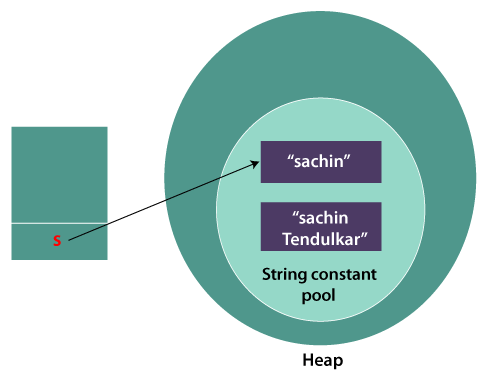Why Are Strings Immutable in Java? Key Reasons and Benefits Described
Exploring the Benefits of Immutable Strings in Modern Programs Paradigms
In the realm of contemporary programming standards, the concept of unalterable strings stands as a cornerstone of durable software application development. By embracing immutable strings, designers can make sure boosted data stability, boosted thread security, simplified debugging processes, boosted protection measures, and reliable efficiency optimization.
Enhanced Data Integrity

By protecting against the adjustment of string items, immutability gets rid of the danger of unintended adjustments to the information they hold. This not only enhances the safety and security of the info however likewise enhances the integrity of the code that counts on these strings.
Immutability also sustains much safer multithreading atmospheres, as concurrent access to immutable strings does not position the risk of data corruption with synchronised modifications. This building simplifies the process of dealing with strings in parallel programs circumstances.
In significance, immutability works as a safety shield around the information stored within strings, boosting their integrity by ensuring that as soon as specified, their values continue to be unmodified throughout the program's execution.

Enhanced String Security
Unalterable strings enhance the string safety and security of programs by ensuring that as soon as a string object is created, its value can not be customized. This home removes the danger of concurrent strings trying to modify the exact same string concurrently, which might lead to data corruption or inconsistent states in the program - Why are strings immutable in Java?. In a multi-threaded environment, where several threads access and manipulate data concurrently, the immutability of strings provides a degree of safety and security by ensuring that the data stays the same throughout its lifecycle
Simplified Debugging Procedures
Given the boosted thread safety promoted by unalterable strings, a considerable benefit develops in the world of simplified debugging processes. Unalterable strings, when created, can not be modified, making it easier to map the circulation of information and determine the source of insects in a program. This immutability ensures that strings remain constant throughout the implementation of the program, decreasing the likelihood of unforeseen changes that could result in mistakes.
When debugging with mutable strings, developers often experience concerns where a string's value is modified unintentionally, making it testing to determine the origin cause of a bug. Nonetheless, with unalterable strings, the information continues to be unmodified, permitting designers to concentrate on evaluating the actual reasoning of the code instead than locating where and when a string was modified incorrectly.
Furthermore, immutable strings streamline the debugging procedure by making it possible for much easier reproduction of bugs. Considering that unalterable strings do not transform state, programmers can recreate and research pests better, causing quicker identification and resolution of concerns within the codebase. over at this website This structured debugging workflow inevitably contributes to greater software quality and enhanced total growth effectiveness.

Boosted Safety And Security Measures
Enhancing data defense and strengthening system stability, the usage of immutable strings in software applications contributes considerably to boosted security actions. Immutable strings likewise play a vital function in preventing typical safety vulnerabilities such as barrier overflows and SQL injection attacks, as efforts to adjust string data at runtime are inherently restricted.
Furthermore, the immutability of strings improves the predictability of program habits, making it simpler to verify inputs and prevent unexpected changes that could jeopardize safety and security. This predictability streamlines the process of bookkeeping and validating code, allowing programmers to determine prospective protection technicalities more efficiently. On the whole, including unalterable strings right into software program development techniques not only boosts the effectiveness and integrity of applications yet also enhances their strength against security threats.
Reliable Performance Optimization
When dealing with mutable strings, procedures like concatenation or substring index creation commonly result in the creation of new string things, leading to memory overhead and raised processing time. By permitting strings to stay stable and continuous, unalterable strings promote better memory administration and caching chances, ultimately improving the general effectiveness of the software application.
Immutable strings also play an essential function in multithreaded atmospheres by advertising thread security. Why are strings immutable in Java?. Because unalterable strings can not be customized when developed, they can be shared across threads without the risk of unforeseen changes, minimizing the requirement for synchronization mechanisms and enhancing concurrency. Moreover, immutable strings streamline debugging processes as developers can trust that a string's value will continue to be consistent throughout the program's execution, removing prospective mistakes triggered by mutable state modifications. In conclusion, the usage of immutable strings not just enhances safety yet additionally dramatically contributes to the efficient efficiency optimization of modern software program systems.
Verdict
To conclude, the advantages of making use of immutable strings in contemporary programs standards can not be overemphasized. Boosted data integrity, enhanced thread safety, simplified debugging procedures, raised safety measures, and efficient efficiency optimization all contribute to the total efficiency of shows jobs. By incorporating unalterable strings into programming methods, designers can take advantage of an extra trusted and durable codebase.
Immutability, a crucial attribute of strings in programs languages such as Java and Python, ensures that once a string object is developed, it can not be modified or modified.Immutable strings improve the thread security of programs by ensuring that as soon as a string object is created, its value see can not be customized. Unalterable strings additionally play an important function in preventing common safety vulnerabilities such as buffer overflows and SQL injection assaults, as efforts to control string information at runtime are naturally limited.
By permitting strings to stay unchangeable and constant, unalterable strings promote better memory management and caching opportunities, ultimately increasing the general efficiency of the software.
Immutable strings simplify debugging processes as programmers can rely on that a string's worth will continue to be consistent throughout the program's implementation, getting rid of possible errors triggered by mutable state changes.